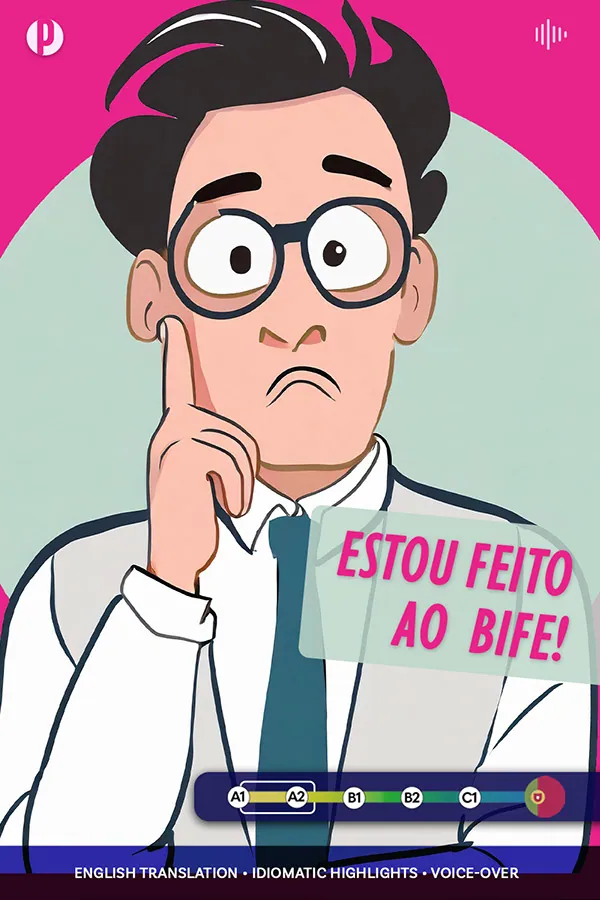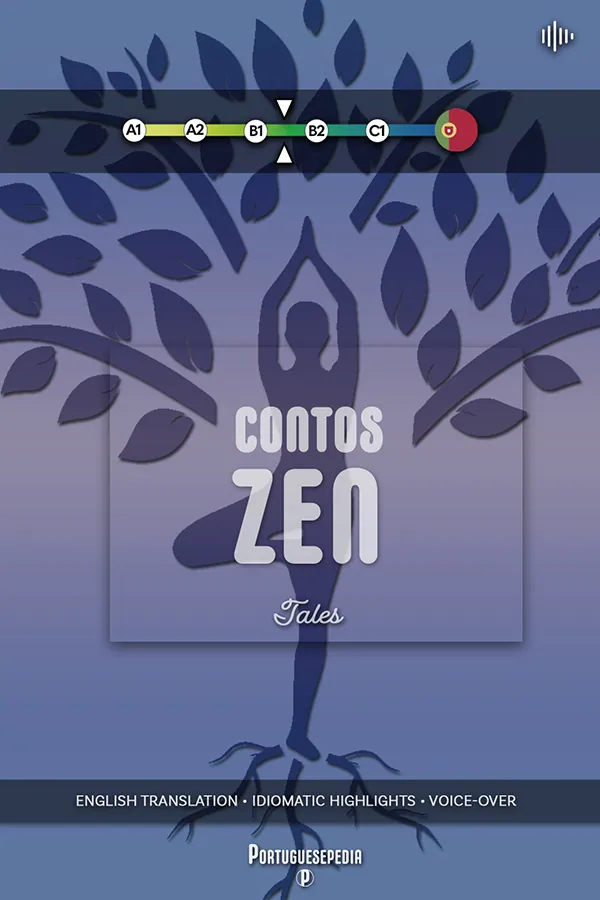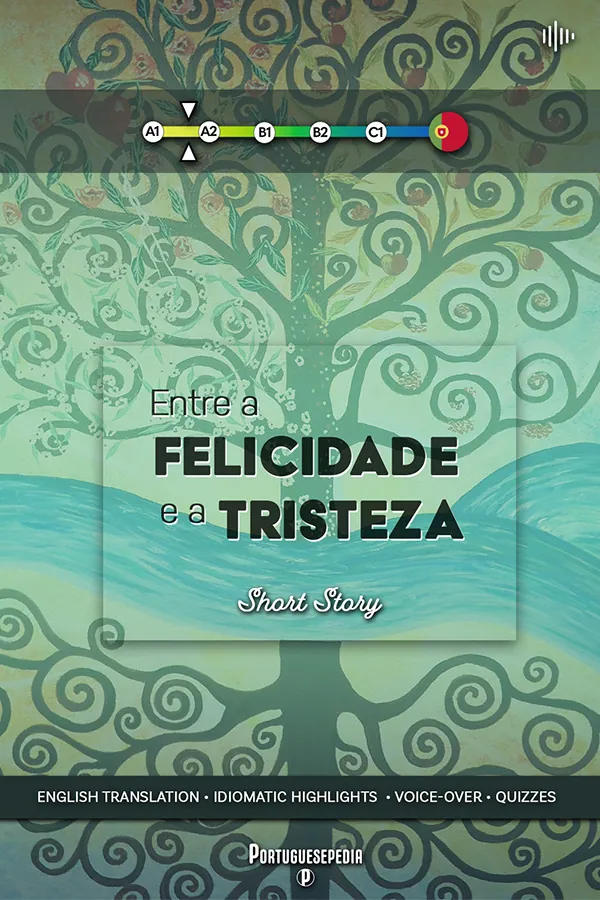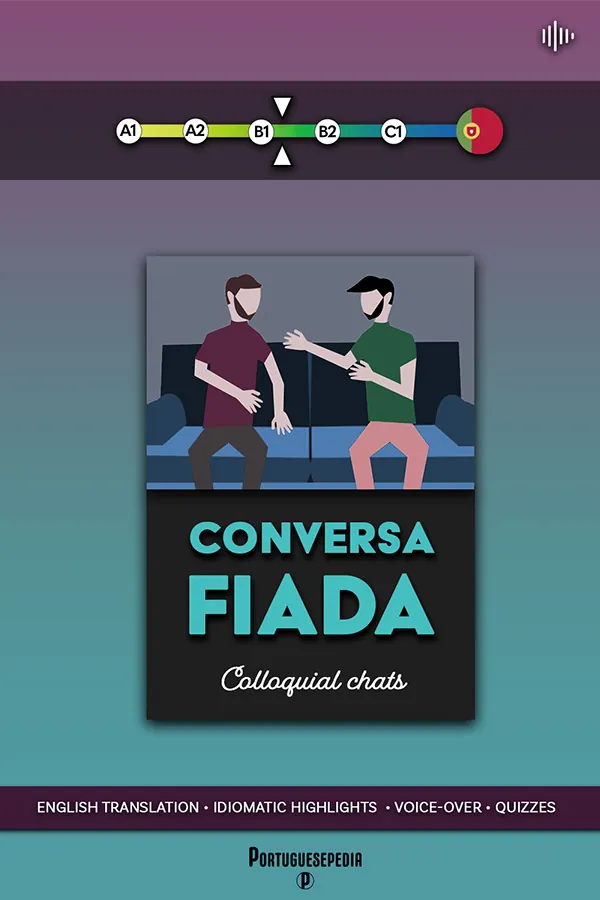
Portuguese vs. Spanish: How Similar Are They Actually?
Portuguese and Spanish are Romance languages that share a common root: they both stem from Vulgar Latin. But how similar are they?
Portuguese and Spanish are different enough to be considered separate languages. They have nonetheless a similar grammar and lexicon that makes them closely related and, to some extent, mutually intelligible. The aspect that differs the most between these languages is their pronunciation.
Now, can native Portuguese speakers understand Spanish native speakers?
Yes, it is relatively easy for native Portuguese speakers to understand Spanish, even speak it. But this is not entirely reciprocal.
Native Spanish speakers seem to have a harder time following along with native Portuguese speakers. This imbalance is mainly due to differences in pronunciation between the two languages (we’ll soon look at them in more detail)
Mutual intelligence between native speakers apart, from a language learning perspective, Knowing either language will help you to learn the other.
In what follows, we’ll look at the similarities and differences between Portuguese and Spanish in greater detail. Read on.
First impressions
Let’s take a glance at what Portuguese and Spanish look and sound like in the written and spoken forms respectively:
Portuguese
Spanish
| Portuguese | Spanish |
| O nosso mundo atual apresenta problemas muito complexos e difíceis de resolver. Entre eles estão as alterações climáticas, a desflorestação, o esgotamento dos recursos naturais, a perda de biodiversidade, fortes desigualdades socioeconómicas e centenas de milhares de pessoas a viver sob pobreza extrema. | Nuestro mundo actual presenta problemas muy complejos y difíciles de resolver. Entre ellos se encuentran el cambio climático, la deforestación, el agotamiento de los recursos naturales, la pérdida de biodiversidad, las fuertes desigualdades socioeconómicas y cientos de millones de personas que viven en extrema pobreza. |
| Our current world presents very complex problems that are difficult to solve. Among them are climate change, deforestation, depletion of natural resources, biodiversity loss, strong socio-economic inequalities and hundreds of millions of people living in extreme poverty. |
As you can see, Portuguese and Spanish are pretty similar in written form.
In the text snippets above, it becomes apparent that almost all verbs and nouns look alike on either side, which means that native speakers of either language can easily read the other tongue.
On the other hand, you’d probably agree that the differences in pronunciation are greater than the differences in text. Spoken Portuguese and Spanish, while still relatable, are less mutually intelligible compared to their written forms.
Now, native Portuguese speakers are more likely to understand Spanish than otherwise. Why? Well, we are more intelligent! Just joking.
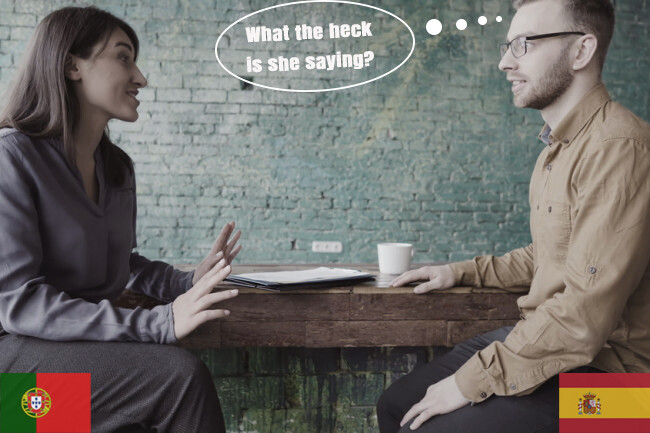
It has to do with this: the Portuguese sound system is more complex than the Spanish. We’ll get there in a while. But first, let’s take a look at the similarities and differences in vocabulary between the languages.
Lexicon
Portuguese-Spanish cognates
Cognates are words that share a common origin and thus look and mean nearly the same. Since both languages originate from Vulgar Latin, cognate words between Portuguese and Spanish are in the thousands.
Indeed, Portuguese and Spanish share nearly 90% of their vocabularies. This means that most words have either a cognate or an equivalent in the other language.
Now, this doesn’t necessarily mean that 90% of the words used in daily life in Portuguese and Spanish will be the same. See, many high-frequency words won’t find a cognate in the other language.
But even if the 90% figure is a bit overrated in practice, it is undeniable that Spanish-Portuguese cognates make these languages mutually intelligible to a high degree, at least in the written form.
Here are a few examples of Portuguese-Spanish noun cognates:
| Portuguese | Spanish | |
| life | vida | vida |
| exit | saída | salida |
| food | comida | comida |
| table | mesa | mesa |
| travel | viagem | viaje |
| eyes | olhos | ojos |
| city | cidade | ciudad |
| . . . | . . . |
A few more cognate examples concerning verbs and adjectives:
| Portuguese | Spanish | |
| eat | comer | comer |
| wash | lavar | lavar |
| sleep | dormir | dormir |
| ugly | feio | feo |
| dark | escuro | oscuro |
| cold | frio | frío |
| happy | contente | contento |
| . . . | . . . |
Let’s now take a look at personal pronouns. Except for the formal 2-person singular, they also look similar on both sides:
| Portuguese | Spanish | |
| I | Eu | Yo |
| You | Tu/você (formal) | Tú/usted (formal) |
| She/he | Ela/ele | Ella/él |
| We | Nós | Nosotros |
| You | Vós (vocês) | Vosotros |
| They | Elas/Eles | Ellas/Ellos |
The same goes for demonstrative pronouns (Portuguese demonstratives on top):
| Masc sing. | fem. sing. | masc. pl. | fem. pl. | |
| this | este éste | esta ésta | estes éstos | estas éstas |
| that | esse ése | essa ésa | esses ésos | essas ésas |
| that over there | aquele aquél | aquela aquélla | aqueles aquéllos | aquelas aquéllas |
! Sometimes, the gender of cognate words might be different on either side. For instance, Portuguese words ending with –agem are normally feminine, whereas their Spanish cognates, ending with –aje, tend to be masculine (e.g. a viagem vs. el viaje).
Further reading. Dive deeper into Spanish-Portuguese cognates: Portuguese-Spanish Cognates and False Friends.
! Semi-cognates
Semi-cognates are cognates that, though semantically relatable, slightly mean different things.
Other times, cognates may share approximately the same meaning, but their usage frequency differs considerably in either language.
For instance, the Portuguese word câmbio is a cognate of the Spanish cambio. However, while the Portuguese câmbio specifically means exchange rate, the Spanish cambio means change (in general) and is, therefore, more widely used in Spanish than in Portuguese (the Portuguese de facto equivalent to cambio is mudança or troca depending on the context).
Another example is the synonymous Portuguese verbs necessitar and precisar and their respective Spanish cognates necesitar and precisar. They all mean need. But while in Portuguese precisar, not necessitar, is commonplace, In Spanish it is the other way around:
(pt) Preciso de ajuda
(sp) Necesito de ayuda
(I need help)
There are, to be sure, dozens of other semi-cognate examples between Portuguese and Spanish, but you get the idea.
Portuguese-Spanish false friends
False friends – or false cognates if you will – are words that look the same in either language but mean different things, potentially leading to misunderstandings. Let’s take a look at a few examples:
| PT–SP False Friends | PT equiv. of SP | SP equiv. of PT |
| acordar waking up acordarse recall | lembrar-se | despertarse |
| barata cockroach barata cheap | barata* | cucaracha |
| cadeira chair cadera hip | anca | silla |
| cena scene cena dinner | jantar | escena |
| embaraçada embarrassed embarazada pregnant | grávida | desconcertado |
| escova brush escoba broom | vassoura | cepillo |
| escritório office escritorio desk | secretária | oficina |
| esquisito weird exquisito exquisite | requintado | raro |
| largo large largo long | comprido | amplio |
| oficina workshop oficina office | escritório | taller |
| polvo octopus polvo dust | pó | pulpo |
| propina** tuition fee propina tip | gorjeta | cuota |
| rato mouse rato a little while (time) | momento | ratón |
| roxo purple rojo red | vermelho | púrpura |
| ruivo redhead rubio blond | loiro | pelirojo |
| trair betray traer bring | trazer | traicionar |
* barato/a in Portuguese also means cheap.
** propina means bribery in Brazilian Portuguese, whereas in Portugal bribery is suborno. Read the following article to learn more about how these two standards of Portuguese compare: European vs. Brazilian Portuguese – How Different Are They, Really?
Portuguese-Spanish dissimilar words
Portuguese-Spanish dissimilar words mean the same thing but look and sound differently on either side. Here are a few examples of high-frequency, dissimilar words:
| Portuguese | Spanish | |
| tap | torneira | grifo |
| window | janela | ventana |
| pen | caneta | bolígrafo |
| neck | pescoço | cuello |
| office | escritório | oficina |
| store | loja | tienda |
| pregnant | grávida | embarazada |
| knee | joelho | rodilla |
| . . . | . . . |
Another instance of commonly used dissimilar words is weekdays. Unlike other Romance languages, Portuguese weekdays don’t allude to celestial bodies or old mythologies. Instead, they are ranked from the second (segunda) through the sixth day (sexta), with sábado and domingo standing for the seventh and first days respectively:
| Portuguese | Spanish | |
| Monday | segunda-feira (2) | lunes (moon) |
| Tuesday | terça-feira (3) | martes (Mars) |
| Wednesday | quarta-feira (4) | miercoles (Mercury) |
| Thursday | quinta-feira (5) | jueves (Jupiter) |
| Friday | sexta-feira (6) | viernes (Venus) |
| Saturday | sábado (7) | sabado |
| Sunday | domingo (1) | domingo |
Portuguese vs. Spanish pronunciation
Portuguese and Spanish languages are least similar in their spoken form. This is mainly because Portuguese has more complex phonology* compared to Spanish – there are more language sounds in Portuguese than in Spanish.
This is also why native Portuguese speakers have an easier time speaking and understanding Spanish than otherwise.
Below, we will look in greater detail at how Portuguese and Spanish differ in pronunciation.
* Note that the Portuguese language sounds mentioned in this section refer to the European standard. Dive deeper into European Portuguese phonology: Portuguese Pronunciation: A Helpful Guide to Portuguese Basic Sounds and Spelling Patterns.
Consonants
Consonants are, in opposition to vowel sounds, speech sounds articulated with partial or total obstruction caused by the tongue, lips, teeth, or any other speech articulator.
Let’s look at some cases where Portuguese consonant sounds differ from Spanish.
A softer Spanish
The Spanish b, d, and g sounds are pronounced more softly than in Portuguese.
In Spanish, you’d pronounce the b without completely closing your lips. The differences are subtle but still noticeable. Here are a few cognate words where you can observe these nuances:
Portuguese
Spanish
| Portuguese | Spanish | |
| know | saber | saber |
| life | vida | vida |
| cat | gato | gato |
Different r-sounds

Olá! I'm Pedro and I'm your Portuguese teacher.
Ready to unlock the beauty of European Portuguese? Portuguesepedia is your key! This all-in-one platform provides a wealth of learning resources, from bite-sized video lessons to immersive idiomatic dips. Perfect your pronunciation and aural comprehension with listening drills and solidify your grammar with in-depth articles. Start your Portuguese journey today!
Share this article
Get my guide "Key Strategies to Learn Portuguese" for FREE.












